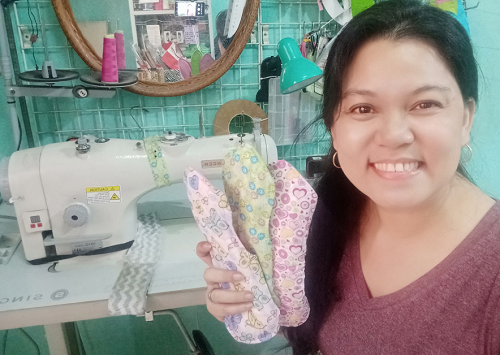Cecille Guevarra is committed to reducing waste - and increasing female comfort during periods. Courtesy Gaia.
Periods are the unspoken problem for many women – and more than that, often for the planet too. Besides often bringing menstrual cramps and fatigue, single-use products that are highly promoted by major corporations are highly polluting for our environment – and can cause medical issues for some. By Beryl Tranco.
Manilla, Philippines, February 2021. Disposable sanitary napkins are products of the modern world’s fixation on convenience. Just a few decades back, most women used reusable cloths to maintain their hygiene and didn’t pollute the environment with waste absorbents, plastics or adhesives.
All Workingmum products are handmade of reusable materials. Courtesy Gaia.
Cecille Guevarra, criginally from Occidental Mindoro in the Philippines and currently based in Santa Cruz, Manila, is the owner of Workingmum, an innovative start-up committed to helping both women and the planet. Her company has joined the growing number of businesses that give a nod to sustainability with their products—in this case washable menstrual pads and pantyliners. Launched some two years ago, Workingmum aims to provide reusable alternatives to disposable sanitary napkins.
“I used to have rashes and blisters wearing (disposables),” explains Cecille. “And I don’t want my daughter to experience these discomforts,” she says.
She started sewing cloth pads for personal use in 2016, so when her daughter started to have her periods, she convinced her to use reusables instead of disposables. Although Cecille still puts together her own products, demand is ramping up so she also subcontracts a second seamstress. “As I manage my own business, I know what it is like to work, so I’m happy to provide livelihood to a single mother,” Cecille says, proud of being able to empower a fellow mother.
When Cecille launched her business, her first buyer was her best friend, whose mother died of cervical cancer. “[My friend] was advised to not use disposable sanitary pads after she had her tissue analysed, following her mother death from cancer,” she says. “So for a ‘friendly’ price, she purchased her first set of cloth pads from me.”
Cecille’s husband is part of the production team at Workingmum. Courtesy Gaia.
Cecille realised there was a demand for her pads, so she linked up with other eco-warriors to resell her products. “I feel Workingmum is classy [for] having buyers from Makati and Bonifacio Global City,” she said, referring to Philippine cities where the well-off live. She says she is aware that more than just wanting to be trendy, many users share the belief in both personal and environmental care. “I am humbled for being an instrument in avoiding disposable pads on the minefield of plastics,” she adds.
While the quarantines declared early in 2020 to contain the spread of the COVID-19 pandemic negatively affected many businesses and caused anxiety to many business owners, Cecille saw opportunity from the situation.
“People were forced to stay at home and have more time to go online. Thus, we received more messages for orders. It seemed these women had no other choice because most of the stores were closed,” she says.
Workingmum makes liner storage bags too. Courtesy Gaia.
Since the lockdowns, another washable has been added to Workingmum’s products— facemasks. “The raw materials for cloth pads were used to make reusable face masks; this means we make quality face masks that sell for a reasonable price,” she says.
Although production is still limited, Cecille prefers not to sell in bulk. “But, there was an exemption,” she explains. “I had a buyer who requested large quantities of masks. I found out that she was donating the facemasks to frontliners,” she shared.
According to Cecille, her business has also been good for her family life. “The manufacturing of the washables has knitted the bond of my marriage. My husband is the ‘master cutter’ of the patterns,” she smiles. “And also I realised that I am an artist creating designs for my own products.” The designs and the materials of the washables, according to Cecille, evolved as time went by.
“We discovered better types of cloth and have upgraded our products since we started. This added some costs on our part but we didn’t change our pricing. We ensure the quality to help keep women and girls feel comfortable while keeping conventional period products out of landfills,” she shares.
“I consider Workingmum a small step to a Zero Waste lifestyle—a small step from each of the women who purchase from us. Our sales may be slow-paced at times yet it is consistent and I am not giving up on it.”
Go to: https://www.no-burn.org/wp-content/uploads/business-unusual-asia-pacific.pdf for more great sustainable stories from SE Asia.



